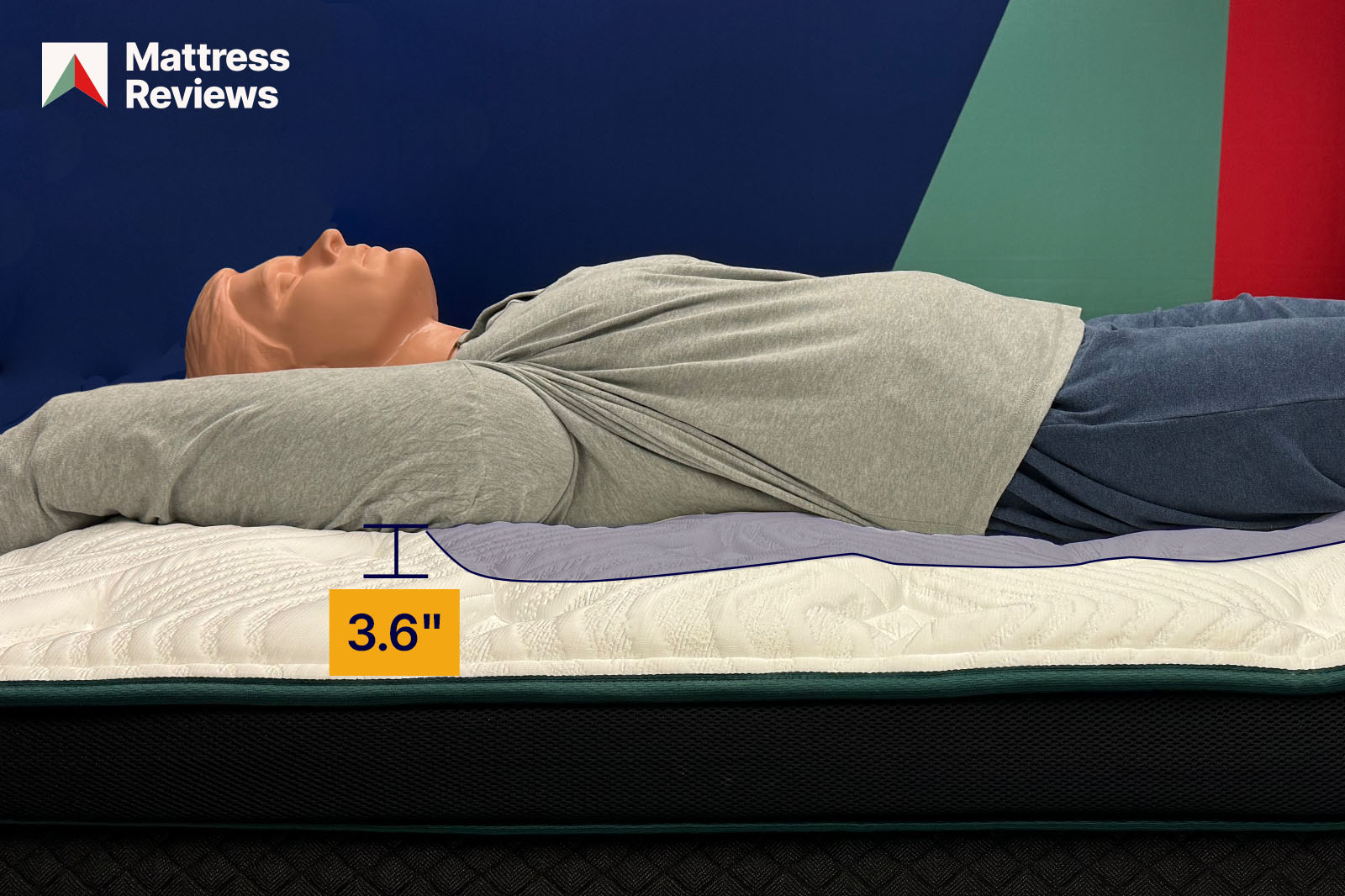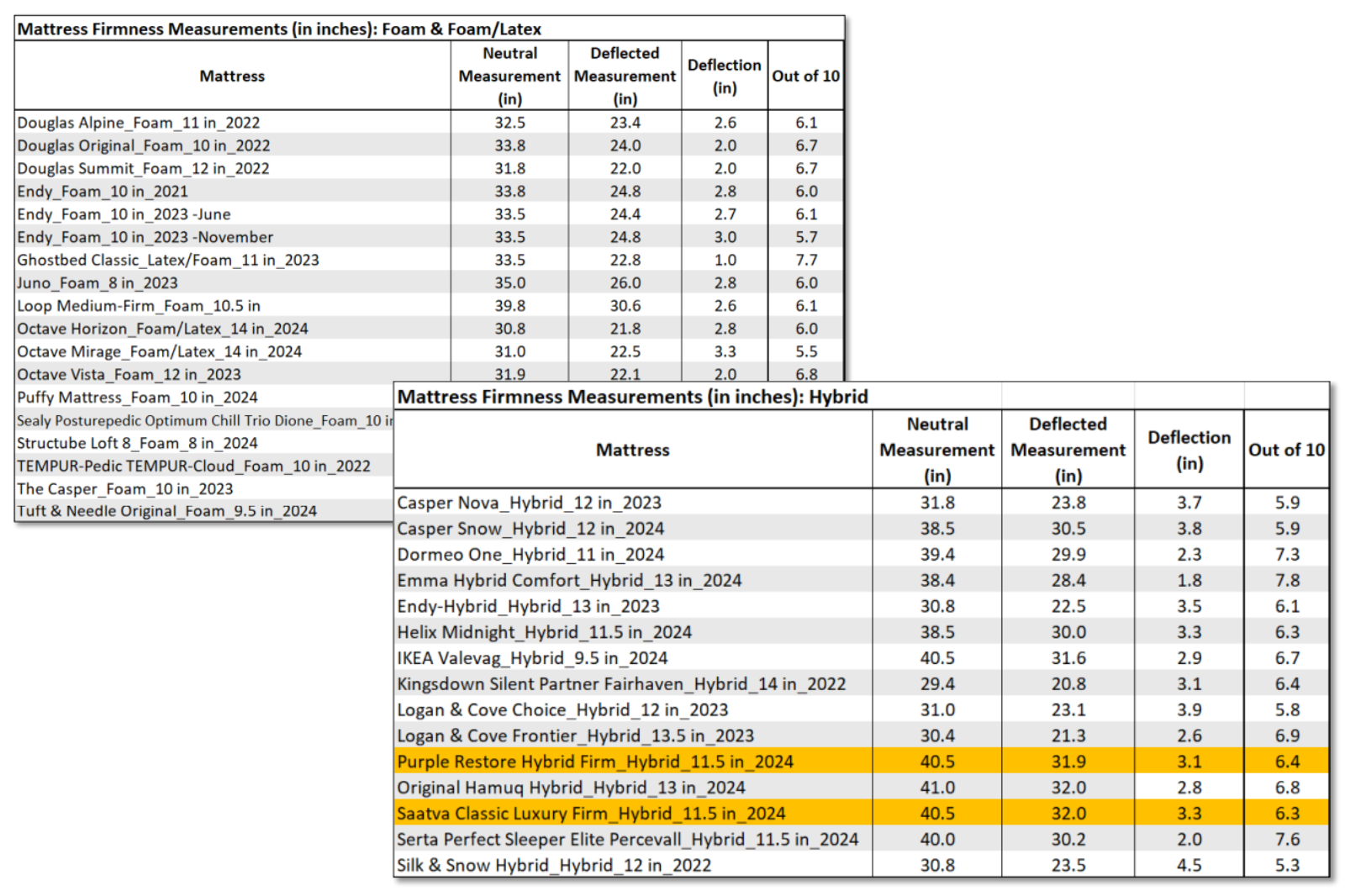Mattress Firmness Scale: An In-Depth Guide (2025)
Updated: October 21, 2025 | Published: July 2, 2024Choosing a mattress with the right firmness can transform your sleep quality. Depending on your sleep style and body type, you might need a soft mattress, firmer mattress, or something in between.
Not sure how to decode the mattress firmness scale or find your perfect fit? In this article, we’ll help you learn about different mattress firmness ratings so you can find the best option for you.
What is mattress firmness?
Mattress firmness reflects how soft or firm your mattress feels when you lie on it. Depending on your build and body weight, a mattress can feel more or less firm. Two people with different body types can experience different firmness and support levels on the same mattress.
What determines a mattress’s firmness is its construction—particularly the thickness of the comfort (top) layer, which influences how firm or soft the mattress feels. The support (bottom) layer typically determines the support level (more details later in this article).
Mattress firmness is measured on a standard scale from 1 to 10, with 1 being very soft and 10 being very firm. Mattress companies often mention the “firmness level” of their mattresses when promoting their products. They may or may not include exact scores, but will generally mention the “feel” of a mattress, which is helpful when buying a mattress online.
The type of mattress can also determine the level of firmness. For example, there are different firmness levels in foam vs spring mattresses. This is because foam provides a different feel compared to metal coils.
How do you determine mattress firmness?
At Mattress Reviews, our firmness testing measures “sinkage,” or how far your body sinks into the mattress. This gives us an objective method to compare various mattresses across different brands.
Independent third-party engineers (commissioned by us) test sinkage using a 5’5″ 170-pound mannequin to simulate the weight distribution of the average human body. They place this mannequin in the middle of the mattress and measure how far it sinks. The deeper it sinks, the softer the mattress.
Different mattresses can have the same firmness rating but feel different due to variations in foam or coil thickness, so we score hybrid/innerspring mattresses separately from foam ones.
Here’s an example of a mattress testing photo featuring our mannequin. Average displacement for the mattress shown is 3.6″, which translates to a score of 6.0/10. Keep reading to find out what that means for the mattress’s feel.

What are the different mattress firmness levels?
Let’s dive into what soft, medium, and firm mattresses truly feel like.
Soft Mattresses
Soft mattresses usually have a firmness rating between 1 and 3 (out of 10) and are often described as “plush.” They tend to have a thicker comfort layer, which is usually made of memory foam.
Softer mattresses provide pressure relief for your shoulders and hips. Their high degree of sinkage creates a “hugging” sensation while you’re lying down.
A softer mattress is ideal for side sleepers weighing under 130 lb. However, if you have a heavier body or don’t have pressure points, you might find softer mattresses claustrophobic. Your hips could also dip below your shoulders when sleeping, which can lead to back pain.
In terms of durability, softer mattresses tend to use more plush materials that can break down faster. This causes the mattress to sag and can lead to a shorter lifespan.
READ MORE: How long should a mattress last?
Medium Mattresses
Medium mattresses usually have a firmness rating between 3 and 7 (out of 10). This is the widest firmness range, and it includes a narrower range of feels described as “medium-soft,” “medium,” and “medium-firm.”
This is the most popular choice of firmness for most sleep styles and body types.
Medium mattresses are moderately supportive but have less “hug” because you won’t sink into them as much. They provide a good balance of comfort and support, and are suitable for most types of sleepers. They tend to be best for sleepers who weigh 120–240 lb.
Medium mattresses tend to last longer than softer mattresses due to their sturdier construction and thinner comfort layers.
READ MORE: Get our ranked list of the best medium-firm mattresses
Firm Mattresses
Firm mattresses usually have a firmness rating between 7 and 10 (out of 10). They tend to have outstanding support and limited “hug,” which gives the mattress a solid feeling when you lie on top of it.
Firm mattresses are ideal for sleepers over 240 lb. Back and stomach sleepers also benefit from using a firm mattress since the limited sinking in the midsection helps keep their spine aligned.
However, if you are a side sleeper or weigh less than 230 lb, you may experience pressure in your shoulders and hips, meaning there’s a greater chance of achy joints in the morning.
Firm mattresses may last the longest thanks to their denser cores and thinner comfort layers, which translates to minimal sagging.
READ MORE: See our picks for the best firm mattress in Canada
What do mattress firmness scores mean?
- Soft (2.9 and under): This firmness level is extra plush, and has a lot of sinkage. Mattresses with this firmness make you feel as though you are being completely enveloped in your bed, which may be uncomfortable since your body would get little to no support. Mattresses with this level of plushness are rare because the materials can cost more, and most shoppers don’t prefer this extreme level of softness.
- Medium-soft (3.0–4.4): These mattresses have considerable sinkage and great pressure-point relief. Sleeping on them could be described as “sleeping on a cloud.” If you are under 130 lb and a side sleeper, you might enjoy a medium-soft mattress. However, a mattress with this level of firmness will provide minimal support, likely not last as long, and be more difficult to find than firmer mattresses.
- Medium (4.5–5.4): Mattresses with a medium level of firmness will feel soft and have some “hug,” but they also have more support. This firmness level is ideal for side sleepers who are under 130 lb, as they have plushness and pressure point relief but thinner comfort layers. This makes them more supportive and longer lasting.
- Medium-firm (5.5–6.9): Medium-firm mattresses are the most common because they work for all sleep styles. These mattresses tend to have decent plushness and good pressure-point relief, but also provide good support. This makes medium-firm mattresses ideal for side, back, stomach, and combination sleepers with a body weight of 130–230 lb.
- Firm (7.0–10): These mattresses have the least plushness, with little to no cushioning and minimal pressure-point relief. They feel very stable when you lie on them, and are ideal for those over 230 pounds and back/stomach sleepers. However, mattresses this firm can worsen (or cause) back, neck, or shoulder pain. Side sleepers should also avoid firm mattresses.
READ MORE: Learn more about our mattress testing methodology
Here’s how these scores appear in our stamped testing report from third-party engineers:

What is the best mattress firmness?
The best mattress firmness is the one that works best for your needs. While medium-firm mattresses work well for all sleep styles, it’s important to choose a mattress that aligns with your preferred sleeping position.
Side Sleepers
For side sleepers, a mattress with a medium-soft to medium-firm feel is ideal. A mattress that’s too firm can cause spine misalignment and joint strain, while one that’s too soft may not provide enough support. Both can lead to back pain.
A medium level of firmness helps relieve pressure on your hips and shoulders, which are common trouble spots for side sleepers.

Back Sleepers
For back sleepers, a medium to firm mattress is often the best choice. This firmness level ensures proper spinal alignment while still contouring around your body’s natural curves.
A firmer feel also prevents your spine from overarching and keeps your body from sinking too deeply into the mattress. This can help prevent or relieve lower back pain.

Stomach Sleepers
Stomach sleepers benefit most from a mattress with a medium-firm to firm feel. This level of firmness prevents the lower body from sinking excessively into the bed, which relieves pressure on the lower back and hips.

Heavy People
Heavier individuals typically benefit from a medium-firm to firm mattress that’s at least 10″ thick, providing ample foam layers for enhanced weight support. This firmness level prevents excessive sinking and allows pressure-point relief without bottoming out.
Some people with heavier bodies will find a mattress softer, so a mattress rated 7/10 for firmness might feel more like 6/10. That means a firmer mattress will provide the necessary support and comfort for heavier sleepers.
 Our Recommendation: Medium-Firm Is Best for Most People
Our Recommendation: Medium-Firm Is Best for Most People
Medium-firm mattresses are generally the best choice for most sleepers, striking a perfect balance between support and comfort. This firmness level maintains proper spinal alignment to reduce back pain while providing enough cushioning to relieve pressure points.
A medium-firm feel is versatile enough to accommodate back, side, and stomach sleepers, making it an ideal option for those who aren’t sure exactly what they need.
Does a firmer mattress provide better support?
Not always. It’s easy to assume that the firmer the mattress, the more support it provides. But firmness refers to how a mattress feels when you lie down on it, whether it’s hard or soft. Support, on the other hand, is how well the mattress keeps your spine aligned and maintains an even sleep surface for your body.
A mattress can provide the same firmness and different support to different people. A softer mattress could provide enough support for a lighter-weight person and not enough for a heavier person. A firmer mattress might be needed to support a stomach sleeper, but might be uncomfortable and unsupportive for a side sleeper.
When you’re considering which firmness level will provide enough support, think about your body type and preferred sleeping positions. Choose your firmness level based on how it affects the positioning and alignment of your spine, not necessarily how the mattress feels. This is crucial for reducing pain and enhancing sleep quality.
READ MORE: How to choose a mattress
So what mattress firmness do you need?
A medium-firm mattress is generally the best choice for most sleepers due to its balanced combination of support and comfort. However, your individual needs may vary, and you could find other firmness levels more suitable. When shopping for a mattress, it’s essential to prioritize proper spinal alignment and personal comfort.
To help you find the perfect fit, check out our list of the best medium-firm mattresses, which offer a great starting point for a restful and supportive night’s sleep.
Get the MattressReviews award-winning Medium-Firm mattress.
Our goal is to provide the information you need to find the mattress that’s right for you. Get started with some of our most popular mattress shopping resources:
- Best Mattress Guides: Best Mattress Canada, Best Mattress In a Box
- Reviews: Douglas Original, Logan & Cove Choice, Juno, Octave Vista
- Comparisons: Douglas vs Endy, Douglas vs Casper
We use independent, third-party engineering firms (commissioned by us) with the APEGA stamp of approval to conduct mattress testing on our behalf, using publicly available data. We review and test all mattresses on 40+ criteria we think are important to you, including price, country of manufacture, sleep trial, warranty, features, materials used, motion isolation and edge support ratings, customer satisfaction reviews, returns, and refunds.
